By Abigail Pollock | Echo
It's not safe to drive at night.
She was driving alone and wrecked her car in an unfamiliar neighborhood. Injured and disoriented, she stumbled down several blocks of houses, banging on doors and calling for assistance. No response, until she stepped onto the porch of the last house. A man came to the door, but he didn't ask her name or call 911. Instead, he aimed a shotgun at her head and pulled the trigger. The police found her body lying on the porch the next day, Saturday Nov. 9.
Her name was Renisha McBride, and she was 19 years old.
McBride is the second person in two months reported shot while seeking assistance after a car accident. In September, Jonathan Ferrell was killed by police after he too wrecked his car and knocked on a stranger's door in the middle of the night. Both victims were young African Americans. Both were unarmed, and both had entered white neighborhoods looking for help.What do these stories tell us about our society?
This article is not about guns and the laws which regulate them. It is not about Stand Your Ground legislation which protects those who shoot first and assess the situation after. It is not about the racial divides that make it more dangerous for some African Americans to enter white neighborhoods than to stay the night in a ditch.
My question has to do with me and you and the culture we help create.
Our society operates within a context of fear. We are taught as children to be suspicious of strangers and to fear the unknown, and in many contexts this is a necessary protection. We can't assume that others always have good intentions or pretend that certain decisions won't put us in danger.
I also support the right of citizens to defend themselves and their property against those who intend harm. Laws and government exist to prevent the liberty of some from violating the liberty of others, and individuals have legal action they can take to preserve their basic human rights.
I don't believe, however, that a society built on mutual mistrust can sustain itself. In the cases of McBride and Ferrell, seeking help in a crisis got them killed. Altruism and compassion have no place in a nation where self-preservation is the primary virtue, and looking out for others is seen as too high of a risk. A society that is so completely self-focused will turn every stranger into the Other-a threat to be avoided or destroyed.
As Christians, we can choose a different narrative. The Old Testament contains 36 commands to "welcome the stranger," and Hebrews 13:2 (ESV) reminds us that in caring for strangers, "some have entertained angels unawares." There are many biblical accounts of radical hospitality that involved personal risk, like the apostles taking in Paul in Acts 9, despite his reputation as an enemy and murderer of Christians.
Jesus himself was clear in Matthew 25 (ESV) that our care for the Other is what sets us apart: "'For I was hungry and you gave me food, I was thirsty and you gave me drink, I was a stranger and you welcomed me . . . as you did it to one of the least of these my brothers, you did it to me.'"Hospitality has historically been a way of not only of caring for others' physical needs, but also of using relationships to break down societal barriers of gender, race, economic class and status.
There are situations where self-defense is justified and when caution should be used in dealing with strangers. However, if we let fear control us, we may find ourselves completely isolated from the world outside our own narrow comfort and self-interest. In missing the opportunity to offer hospitality and assistance to those in need, we rob our society of its healthy interdependence and deprive ourselves of the opportunity to break down walls of hostility and fear.





